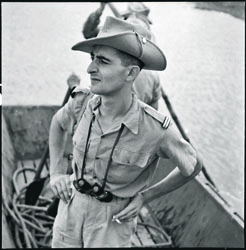
THE PHOTO IS OF A GRAVESITE in the spring of 1952. Jean de Lattre de Tassigny, the famed French army general, bends to kiss the flag-draped coffin of his son, Bernard, a 23-year-old lieutenant killed in Indochina. A hero grieves for a hero, the newspapers say.
Bernard de Lattre de Tassigny had first become a hero a few years earlier, during World War II. He was 15, and his father was a prisoner of the Vichy French after fighting valiantly in the Battle of France. Visiting Jean in 1943, Bernard and his mother smuggled in a small saw, tucked in a flower bouquet, as well as a rope.
The general escaped, joined the Free French, and led the French First Army on its march into Germany in 1944. Though Bernard was too young to join the army, the French leader Charles de Gaulle granted him a waiver to fight in the campaign, where he distinguished himself, becoming the youngest recipient of the Médaille Militaire, an honor established by Napoleon III in 1852.
In 1949, Bernard went to French Indochina to fight the Viet Minh. He earned praise from superiors for his efforts to win over the peasantry with building projects and relief help. He “has captured the hearts of the local population,” one report declared. Meanwhile, he urged his father to come to Indochina and take charge as the war ground into its fourth year. “What we need is a leader who leads,” he wrote Jean.
The general arrived in December 1950, bolstered morale, won U.S. support and weapons, and improved France’s position. In May 1951, he proudly awarded Bernard, now a squadron leader, the Croix de Guerre for his unit’s outstanding performance.
A few weeks later, Jean was bragging about his son to reporters when news reached him that Bernard had been killed in a mortar attack, his body riddled with 80 shrapnel wounds.
“Forgive me for not having been able to protect our son,” the general wrote his wife. Bernard’s death shook the proud general. The war’s fortunes soon turned against him, and his health declined. In January 1952, he died of cancer and was buried in a grave next to his warrior son.





